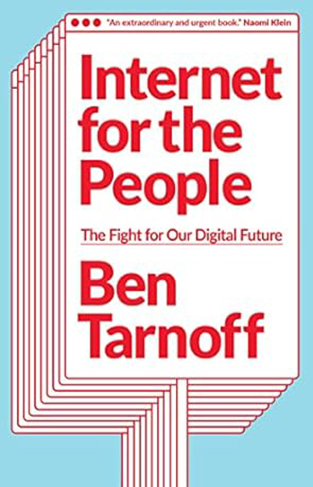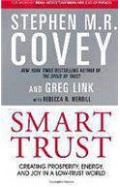- Home
- Business & Management
- Business & Finance
- Internet for the People - The Fight for Our Digital Future
Internet for the People - The Fight for Our Digital Future
By: Ben Tarnoff
-
Rs 4,495.50
- Rs 4,995.00
- 10%
You save Rs 499.50.
Due to constant currency fluctuation, prices are subject to change with or without notice.
The solution to those crises is straightforward: deprivatize the internet. Deprivatization aims at creating an internet where people, and not profit, rule. It calls for shrinking the space of the market and diminishing the power of the profit motive. It calls for abolishing the walled gardens of Google, Facebook, and the other giants that dominate our digital lives and developing publicly and cooperatively owned alternatives that encode real democratic control. To build a better internet, we need to change how it is owned and organized. Not with an eye towards making markets work better, but towards making them less dominant. Not in order to create a more competitive or more rule-bound version of privatization, but to overturn it. Otherwise, a small number of executives and investors will continue to make choices on everyone’s behalf, and these choices will remain tightly bound by the demands of the market. It's time to demand an internet by, and for, the people now.
The solution to those crises is straightforward: deprivatize the internet. Deprivatization aims at creating an internet where people, and not profit, rule. It calls for shrinking the space of the market and diminishing the power of the profit motive. It calls for abolishing the walled gardens of Google, Facebook, and the other giants that dominate our digital lives and developing publicly and cooperatively owned alternatives that encode real democratic control. To build a better internet, we need to change how it is owned and organized. Not with an eye towards making markets work better, but towards making them less dominant. Not in order to create a more competitive or more rule-bound version of privatization, but to overturn it. Otherwise, a small number of executives and investors will continue to make choices on everyone’s behalf, and these choices will remain tightly bound by the demands of the market. It's time to demand an internet by, and for, the people now.
The Bohemians Mark Twain and the San Francisco Writers Who Reinvented American Literature
By: Ben Tarnoff
Rs 1,572.50 Rs 1,850.00 Ex Tax :Rs 1,572.50
Internet for the People - The Fight for Our Digital Future
By: Ben Tarnoff
Rs 4,495.50 Rs 4,995.00 Ex Tax :Rs 4,495.50
Zubin Mehta: A Musical Journey (An Authorized Biography)
By: VOID - Bakhtiar K. Dadabhoy
Rs 892.50 Rs 1,050.00 Ex Tax :Rs 892.50
The Black Swan The Impact Of The Highly Improbable
By: Nassim Nicholas Taleb
Rs 2,965.50 Rs 3,295.00 Ex Tax :Rs 2,965.50
Beyond The Crash: Overcoming The First Crisis Of Globalisation
By: Gordon Brown
Rs 335.75 Rs 395.00 Ex Tax :Rs 335.75
Reset: How This Crisis Can Restore Our Values and Renew America
By: Kurt Andersen
Rs 450.00 Rs 500.00 Ex Tax :Rs 450.00
Powershift Knowledge Wealth And Violence at the Edge of the 21st Century
By: Alvin Toffler
Rs 1,440.75 Rs 1,695.00 Ex Tax :Rs 1,440.75
High Financier: The Lives And Time Of Siegmund Warburg
By: Niall Ferguson
Rs 2,197.50 Rs 4,395.00 Ex Tax :Rs 2,197.50
Why Smart People Make Big Money Mistakes and How to Correct Them
By: Gary Belsky
Rs 1,185.75 Rs 1,395.00 Ex Tax :Rs 1,185.75
Harvard Bune Riew On Greeni Your Bune Profitably
By: Harvard Business School
Rs 1,355.75 Rs 1,595.00 Ex Tax :Rs 1,355.75
No similar books from this author available at the moment.
Bezonomics - How Amazon Is Changing Our Lives, and What the World's Best Companies Are Learning from It
By: Brian Dumaine
Rs 2,375.75 Rs 2,795.00 Ex Tax :Rs 2,375.75
Zubin Mehta: A Musical Journey (An Authorized Biography)
By: VOID - Bakhtiar K. Dadabhoy
Rs 892.50 Rs 1,050.00 Ex Tax :Rs 892.50
The Bohemians Mark Twain and the San Francisco Writers Who Reinvented American Literature
By: Ben Tarnoff
Rs 1,572.50 Rs 1,850.00 Ex Tax :Rs 1,572.50
Internet for the People - The Fight for Our Digital Future
By: Ben Tarnoff
Rs 4,495.50 Rs 4,995.00 Ex Tax :Rs 4,495.50















-120x187.jpg?q6)















